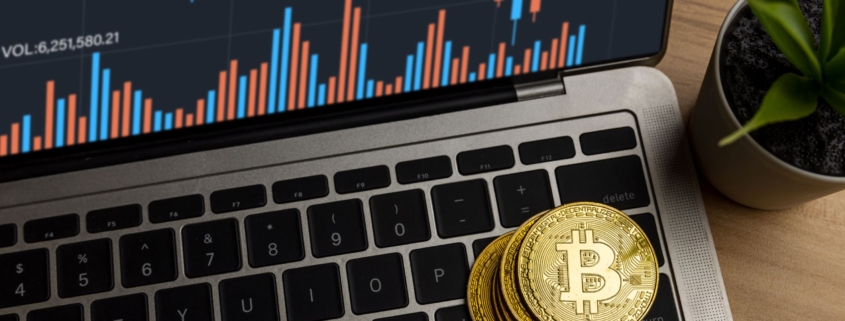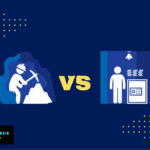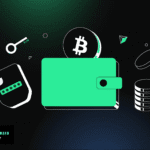How Do I Avoid Crypto Wallet Scams? A Complete Guide to Keeping Your Crypto Safe
Here’s What’s Inside This Blog Post1 Understanding What Crypto Wallet Scams Are2 How to Identify Common Crypto Wallet Scams?2.1

Here’s What’s Inside This Blog Post
- 1 Understanding What Crypto Wallet Scams Are
- 2 How to Identify Common Crypto Wallet Scams?
- 3 10 Essential Tips to Avoid Crypto Wallet Scams
- 3.1 1. Use Official Wallets from Trusted Sources
- 3.2 2. Enable 2FA Wherever Possible
- 3.3 3. Never Share Your Private Key or Seed Phrase
- 3.4 4. Avoid Clicking on Unknown Links
- 3.5 5. Use a Hardware Wallet for Large Holdings
- 3.6 6. Stay Away from Suspicious Airdrops and Giveaways
- 3.7 7. Verify Wallet Addresses Manually
- 3.8 8. Be Cautious with Unsolicited Offers
- 3.9 9. Use Reputable Anti-Malware Tools
- 3.10 10. Keep Your Software and Wallet Updated
- 3.11 11. Educate Yourself on Common Scams
- 3.12 12. Report Suspicious Activity
- 3.13 13. Avoid Public Wi-Fi
- 4 Scary Stats: The Cost of Wallet Scams
- 5 Always Staying Updated With Security Practices
- 6 Choosing A Secure Wallet
- 7 Recommended Wallets with Good Security Track Record
- 8 How To Secure Your Private Keys?
- 9 Frequently Asked Questions
- 10 Final Thoughts: Stay One Step Ahead of Crypto Wallet Scams
Avoiding crypto wallet scams can seem tricky. But, it’s possible with the right knowledge.
As the popularity of cryptocurrencies continues to grow, so does the number of crypto wallet scams targeting unaware users. Whether you’re a seasoned investor or a beginner exploring the world of digital assets, protecting your crypto wallet is crucial. Scammers are everywhere, looking to steal your funds. They use smart tricks to fool you. So, how do you keep your crypto safe? Understanding common scams is key.
You need to know what to look out for. This will help you protect your wallet and your investments. IIn this article, we’ll break down how scammers operate, the red flags to look for, and proven tips to avoid crypto wallet scams and beyond. Stay informed and stay safe.

Credit: danewscenter.com
Understanding What Crypto Wallet Scams Are
Crypto wallet scams are fraudulent tactics used by cybercriminals to gain unauthorized access to a user’s private keys or seed phrases, ultimately stealing the funds stored in the wallet. These scams range from phishing attempts to fake wallet apps, and they are becoming more sophisticated every year.
Types of Wallet Scams Include:
- Phishing emails and websites that mimic legitimate wallet providers
- Fake wallet apps on Android and iOS stores
- Social engineering attacks via Telegram, Discord, or fake customer support
- Malicious browser extensions that monitor clipboard activity
- QR code spoofing to redirect crypto transfers
How to Identify Common Crypto Wallet Scams?
Protect your crypto assets by learning to spot common wallet scams. Always verify wallet addresses and beware of phishing attempts. Use trusted platforms and enable two-factor authentication for extra security.
Understanding common crypto wallet scams can help you protect your assets. Scammers use many tricks to steal your cryptocurrency. Recognizing these scams is your first line of defense.
Phishing Scams
Phishing scams often involve fake emails or websites. These look like they come from real companies. They ask you to enter your wallet details. This can lead to losing your funds. Always check the sender’s email address. Look for spelling mistakes and odd links. Verify the website’s URL before entering any information.
Fake Wallet Apps
Fake wallet apps can be found in app stores. They look like real wallet apps. But they are designed to steal your funds. Read user reviews before downloading. Check the developer’s name. Ensure it matches the official wallet provider. Be cautious of apps with few downloads or recent updates.
By staying alert, you can avoid these common crypto wallet scams. Always double-check information and be wary of unsolicited requests.
Recognizing Red Flags
Recognizing red flags in the world of crypto wallets is crucial. Scammers often use clever tactics to trick you. Knowing what to look for can save you from losing your valuable assets. Let’s dive into some common red flags to watch out for.
Unsolicited Messages
Be cautious if you receive unexpected messages. Scammers often send emails or texts. They may claim to offer wallet upgrades or security checks. They might also pretend to be customer support. Always verify the sender before taking any action. Do not click on links or download attachments from unknown sources. Your vigilance can prevent phishing attacks.
High Return Promises
Beware of promises that sound too good to be true. Scammers lure victims with high return guarantees. They often claim to have insider knowledge or secret methods. These offers are usually fake. Always research and verify any investment opportunity. Trust only reputable sources and avoid quick gains. Remember, if it seems too good to be true, it probably is.
10 Essential Tips to Avoid Crypto Wallet Scams
1. Use Official Wallets from Trusted Sources
Always download wallets from official websites or verified app store accounts. Avoid sideloading APKs or using third-party download sites. Stick to well-known and trusted platforms like Coinbase, Crypto.com, Ledger, or Trezor. These providers have robust security measures and are less likely to be compromised. Datavisor advises conducting thorough research, verifying the provider’s reputation, checking reviews and ratings, and ensuring they are widely recognized
2. Enable 2FA Wherever Possible
Two-Factor Authentication adds an extra layer of protection to your wallet login, especially for hot wallets and custodial services like exchanges.
2FA adds an extra layer of security by requiring a secondary verification method, such as a code sent to your mobile device. This makes it harder for scammers to access your accounts even if they obtain your password. The Blockchain Support Center strongly recommends enabling 2FA, noting it as an advanced measure to secure accounts, as seen in the same article. Use apps like Google Authenticator for time-based codes, which are more secure than SMS-based 2FA
Your recovery phrase, private key, and wallet password are critical to your security. Never share them with anyone, even if they claim to represent a legitimate company. The Blockchain Support Center emphasizes that these details are confidential and should never be shared, including with individuals claiming to represent Blockchain.com
No legitimate service will ever ask for your 12 or 24-word recovery phrase. Store it offline, ideally in a secure physical location or a hardware wallet backup card. A point reinforced by the Massachusetts Attorney General in Beware Cryptocurrency Scams.
4. Avoid Clicking on Unknown Links
Be cautious of unsolicited messages, emails, or social media posts, especially those asking for sensitive information or directing you to a website. The DFPI warns of phishing attempts ranked as the top on-chain threat in CertiK’s Hack3d Web3 Security Report 2024, claiming $1.05 billion from victims last year.
Phishing links often look convincing. Always check the URL spelling and verify it’s HTTPS secured. Check the legitimacy of websites using tools like Google’s safe browsing checker. Look for “[invalid url, do not cite] in the URL and ensure there are no misspellings or unusual characters, as recommended by Datavisor. Scammers often create fake websites that mimic legitimate ones, so always double-check before entering any information.
5. Use a Hardware Wallet for Large Holdings
For significant amounts of cryptocurrency, consider using hardware wallets like Ledger or Trezor. These store your crypto offline, making it nearly impossible for hackers to access. The DFPI recommends “cold storage” such as hardware wallets for assets, as noted in Crypto scams: how to avoid becoming a victim, and Datavisor highlights hardware wallet integration as a security feature of legitimate wallets.
Hardware wallets are especially useful for long-term storage and provide an extra layer of protection against online threats.
6. Stay Away from Suspicious Airdrops and Giveaways
Many scams promote fake airdrops that require users to “connect wallet” or send ETH/BNB first. If it sounds too easy, it’s probably a trap.
7. Verify Wallet Addresses Manually
Don’t copy-paste addresses blindly. Use a QR scanner with checksum verification or manually double-check every address.
8. Be Cautious with Unsolicited Offers
Avoid investing in schemes that require you to send cryptocurrency to an unknown wallet or platform, a warning echoed by the Massachusetts Attorney General, which advises not responding to personal solicitations involving cryptocurrency from unknown sources, as seen in Beware Cryptocurrency Scams.
If an investment opportunity or job offer seems too good to be true, it probably is. Scammers often promise high returns or guaranteed profits to lure victims, as noted by the FTC in What To Know About Cryptocurrency and Scams.
Scammers pose as influencers, developers, or support agents. Always confirm through official accounts or community channels.
9. Use Reputable Anti-Malware Tools
Protect your computer and mobile device with updated antivirus and anti-spyware software to block clipboard hijackers and keyloggers.
10. Keep Your Software and Wallet Updated
Updates often include critical security patches. Always use the latest version of wallet apps and browser extensions.
11. Educate Yourself on Common Scams
Engage with reputable crypto communities and follow trusted sources like the DFPI or Datavisor for updates on emerging threats, a strategy supported by How to Avoid Crypto Scams (with 8 Tips to Keep Your Assets Safe).
Learn about the latest scam tactics, such as phishing, fake wallets, and rug pulls. Staying informed helps you recognize red flags early. Blockpit recommends engaging with reputable crypto communities and committing to continuous learning about scam tactics and security measures, as seen in Crypto Scams: How to Identify & Prevent Crypto Fraud [2025].
12. Report Suspicious Activity
If you encounter a potential scam, report it to local authorities, the FBI, or relevant platforms. Providing details like wallet addresses and transaction hashes can help track down scammers. The Massachusetts Attorney General advises reporting to local police and filing a report with the FBI, including wallet address, scammer’s wallet address, and transaction hash, as detailed in Beware Cryptocurrency Scams.
In Massachusetts, you can file a complaint with the Attorney General’s office for potential help in tracing funds, a service that may assist using blockchain analytics, as noted in the same article.
Notify your wallet provider if you suspect fraud. They may have protocols in place to address such issues swiftly. Most wallet providers offer customer support. Contact them directly through their official channels for a prompt response.Sharing your experience with the provider can also help improve their security measures. This can prevent future scams and protect other users.
13. Avoid Public Wi-Fi
Using public Wi-Fi can expose your crypto wallet to hackers. Always connect to a secure and private network. This helps keep your digital assets safe.
When it comes to securing your crypto wallet, one important step is avoiding public Wi-Fi. Public Wi-Fi networks can be a hacker’s playground. Connecting your device to these networks can expose your wallet to numerous security risks. Let’s dive into why you should be cautious and how you can protect yourself.
Use VPN For Security in public areas. VPNs can also mask your IP address. This means your online actions are harder to trace. It’s an added layer of privacy that can keep your crypto wallet safe. Consider investing in a reliable VPN. It’s a small price to pay for the security it provides.
Scary Stats: The Cost of Wallet Scams
According to Chainalysis, crypto scams stole over $5.9 billion in 2023.
More than 30% of scam victims lost funds due to phishing and fake wallet apps.
Mobile users are most vulnerable, especially on Android due to sideloaded apps.
Always Staying Updated With Security Practices
When dealing with cryptocurrency, staying updated with security practices is crucial to avoid scams and protect your assets. The crypto world evolves rapidly, and so do the methods used by scammers. By keeping yourself informed and vigilant, you can significantly reduce the risk of falling victim to fraud. Here are some practical steps to help you stay ahead of potential threats.
Following Trusted Sources
Make sure you follow trusted sources for news and updates about cryptocurrency security. These sources include reputable websites, official social media accounts, and industry experts. Consistently check these channels for the latest information and best practices.
Always verify the credibility of the source before acting on any advice. Scammers often mimic legitimate sources to deceive you. Be cautious and cross-reference information if something seems off.
Regular Software Updates
Keep your crypto wallet software up-to-date. Developers frequently release updates to fix security vulnerabilities and improve performance. By ignoring these updates, you leave your wallet susceptible to attacks.
Enable automatic updates if possible. This ensures you don’t miss critical patches. If manual updates are required, set reminders to check for new versions regularly.
Think about the consequences of neglecting updates. A single outdated software version can be a weak link that compromises your entire crypto portfolio.
Have you ever wondered how often you should update your software? The answer is as soon as updates are available. Prompt action can be the difference between security and vulnerability.
Staying informed and proactive is key. By following these practices, you can safeguard your investments and enjoy the benefits of cryptocurrency with peace of mind.
:max_bytes(150000):strip_icc()/GettyImages-1222829734-2c9847bd6d4e46c6ac20712bad94d9de.jpg)
Credit: www.investopedia.com
Choosing A Secure Wallet
Choosing a secure wallet is key to avoid crypto wallet scams. A secure wallet keeps your digital assets safe. There are two main types of secure wallets: hardware wallets and reputable software wallets. Each has its own strengths.
Hardware Wallets
Hardware wallets store your private keys offline. This makes them very secure. They look like USB drives. You connect them to your computer only when needed. They protect your assets from online threats. Popular options include Ledger and Trezor. Always buy from the official site.
Reputable Software Wallets
Reputable software wallets are also known as hot wallets. They store your private keys online. Choose a wallet with strong security features. Look for wallets with two-factor authentication. Examples include Exodus and Trust Wallet. Only download wallets from trusted sources. Check user reviews and ratings.
Recommended Wallets with Good Security Track Record
| Wallet Name | Type | Security Features |
|---|---|---|
| Ledger Nano X | Hardware | PIN, secure element chip, Bluetooth encryption |
| Trezor Model T | Hardware | Open-source firmware, recovery seed |
| MetaMask | Hot Wallet | 2FA (via wallet extensions), open-source |
| Trust Wallet | Mobile | Biometric lock, backup phrase encryption |
| Exodus | Desktop/Mobile | Real-time sync, password & seed protection |
How To Secure Your Private Keys?
Your private key is the gateway to your crypto assets. Keeping it secure is crucial to avoid scams and theft. There are proven methods to enhance the security of your private keys, especially when storing them offline.
Storing Keys Offline
One effective way to secure your private keys is by storing them offline. Avoid storing keys on devices connected to the internet, like your computer or phone. These can be vulnerable to hacking.
Consider using a hardware wallet. These devices store your keys offline and require physical access for transactions. This adds an extra layer of security.
Think about it: would you leave your house keys in plain sight? Your private keys need the same level of protection.
Using Cold Storage
Cold storage is another powerful method to protect your private keys. Cold storage means keeping your keys in a device that is never connected to the internet. This reduces the risk of online attacks.
Paper wallets are a popular form of cold storage. You print your private keys and store the paper securely. Make sure to use a high-quality printer and keep the paper in a safe place.
Alternatively, you can use a dedicated cold storage device. These are designed to store private keys securely, away from online threats.
Have you ever considered the consequences of losing access to your crypto assets? Securing your private keys is the key to peace of mind.
Frequently Asked Questions
What Are The Biggest Four Common Cryptocurrency Scams?
The biggest four common cryptocurrency scams are phishing, Ponzi schemes, fake exchanges, and fraudulent initial coin offerings (ICOs).
Can Someone Steal Your Crypto If You Give Them Your Wallet Address?
No, someone cannot steal your crypto with just your wallet address. The wallet address is public information.
How To Spot A Crypto Scammer?
Spot a crypto scammer by identifying unrealistic promises, anonymous teams, lack of transparency, unsolicited messages, and fake social media profiles. Always research thoroughly.
How Can Cryptocurrency Scams Be Prevented?
Research thoroughly before investing. Use reputable exchanges. Enable two-factor authentication. Beware of phishing attempts. Never share private keys.
Final Thoughts: Stay One Step Ahead of Crypto Wallet Scams
The best way to avoid crypto wallet scams is to stay informed, stay cautious, and prioritize security. Scammers prey on users who are rushed, uninformed, or overly trusting. With the rise of AI-generated phishing sites and deepfake impersonations, the need for digital vigilance is greater than ever.
By following the security tips outlined in this guide, you significantly reduce your risk of falling victim to a wallet scam. Whether you’re holding Bitcoin, Ethereum, or altcoins, protecting your private keys is the first rule of crypto ownership.












